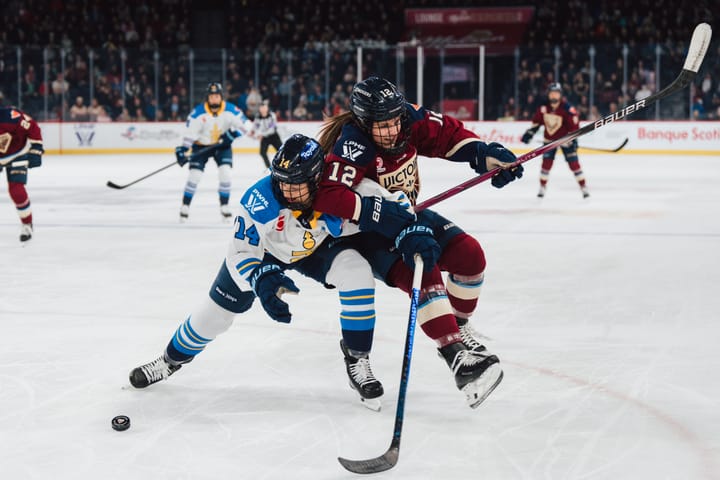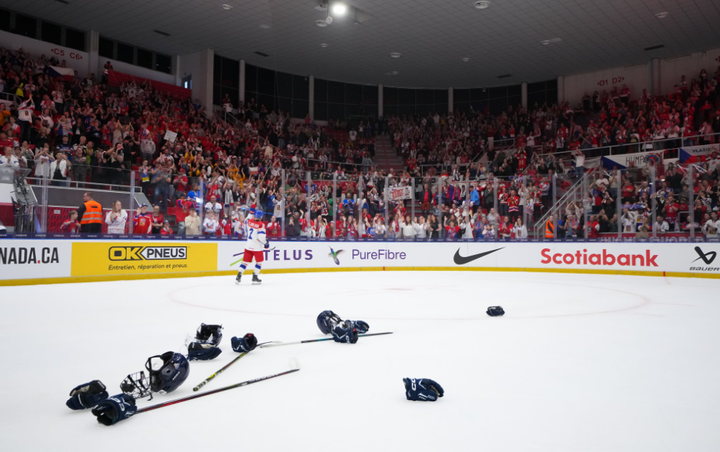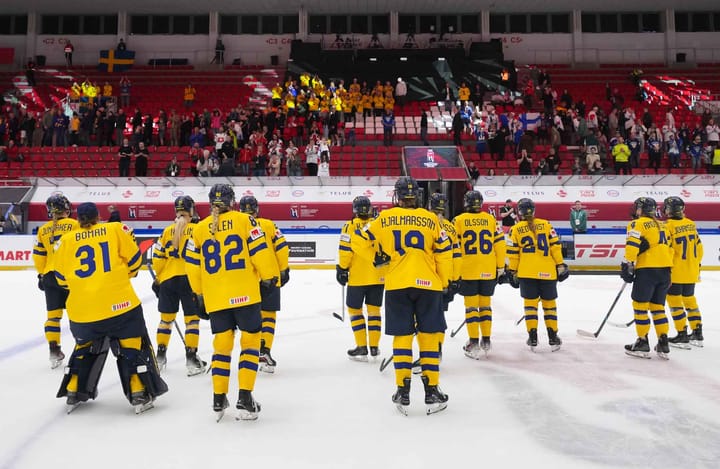As the new WCHA Women’s Commissioner, Jennifer Flowers hopes to empower
Flowers is taking the WCHA’s reins later this month following Katie Million’s departure
Earlier in June, the Western Collegiate Hockey Association (WCHA) announced Jennifer Flowers as its new women’s league commissioner. She’ll be succeeding Katie Million, who’s been at the helm of the league since 2016.
Flowers has been serving as the Assistant Commissioner of the Northern Sun Intercollegiate Conference (NSIC) and will officially begin her duties with the WCHA later in July. During her time at the NSIC and throughout her career, empowering women in sports has been a primary focus. So when the opportunity to work with the WCHA and its players presented itself, she took it.
“I don’t think it’s a secret, for those that know me well, that I’m extremely passionate about women in sport, and what sport can do for women in terms of leadership opportunities and growth and things like that,” Flowers said in an interview with The Ice Garden. “And so really being able to kind of narrow my focus and have the opportunity to work with such high-level female athletes, that was a huge, huge draw.”
Four of the WCHA’s member institutions—Bemidji State, Minnesota Duluth, St. Cloud State, and Minnesota State—also compete in the NSIC in sports besides ice hockey, so she has a relationship with those schools and a good understanding of how their values align with her own. And she says the WCHA’s own reputation as a premier women’s hockey conference, and the success the conference has achieved on a national scale, was definitely enticing.
The WCHA’s prominence on the ice is well known, with 16 of 19 national championships won by WCHA teams, but Flowers hopes to spearhead growth for the conference in a number of other areas. Her track record from her time at the NSIC lends plenty of reason to believe she’ll push the conference forward in terms of student-athlete engagement and leadership opportunities off the ice as well as continued success on it.
Ultimately, she wants to make sure the players’ experience in the WCHA is not just an exciting part of their college years, but one that propels them to unbridled success once they leave campus, too.
“I want them to walk away, when they’re done, really proud of what the WCHA has done for them,” Flowers said. “And whether that means on the ice, and their successes on the ice, or whether that means this one community engagement event where I met the person who ended up hiring me, you never know.
“I just want to find ways to expose our fantastic student athletes so we can help them move forward.”
While at the NSIC, Flowers wore many hats, serving as the office liaison in support of the conference’s senior women’s administrators, faculty athletic representatives, Student-Athlete Advisory Committees, and officials coordinators. She led a number of efforts to foster growth for the conference in terms of academics, inclusion, community engagement, and other key areas. She helped lead the launch of the NSIC’s SAAC Cup and create the NSIC Elite 18 award to recognize the student-athlete with the top GPA in each sport. She also led the committee that created the league’s first transgender student-athlete participation guidelines.
Flowers helped lead several initiatives that foster leadership and growth opportunities for women, and directly impact women in sports. She’s the Co-Chair of the Minnesota Coalition for Women in Athletic Leadership and also serves as a mentor in the Women Leaders in College Sports mentoring program. At the NSIC, she oversaw the creation of the Women’s Leadership Symposium, formerly the Women’s Coaches Symposium.
“It started as an opportunity to strengthen relationships among women in our league,” Flowers said. “And we started it as just coaches and realized pretty quickly that there’s a lot of other women on campus that can utilize these same relationships, the same sort of support system, and the same idea that you’re not in this alone.”
That program was launched in 2017, and she says the conference has already seen signs of growth that have spurred off of it. In the past year, the NSIC had four senior women’s administrators advance to AD positions. While that may not be a direct correlation, it’s certainly a testament to her and the NSIC’s commitment to creating an environment that elevates women in sports and in the wider professional landscape.
This past year, the third year for the program, Flowers says 80 people took part in it, from upperclassmen student athletes to admissions staff to coaches. Whether they had spent 30 years in athletics or were just thinking about starting a career in sports, the message was clear for everyone who attended: you bring value to your role and there is a place for you in the business of sports.
“I think as women, there’s so much pressure, when you get that opportunity to be at the table, that you don’t screw it up, and that you are ready for it,” Flowers said. “As much as it was a relationship builder and an opportunity to grow a network, it was a confidence and leadership opportunity for folks who maybe hadn’t had that before, because that’s not in the day to day. That’s not what your focus is for anyone. I mean, your focus is on what you’re doing day to day. And so [the goal was] to take a step back, and really figure out ways to understand who you are, and what value you have, because we all have value, and then how to bring it and how to use it.”
Flowers aims to empower the WCHA’s players in the same manner. Her plan is to spend time getting to know the players once she’s officially set in her new role, and gaining an understanding of their needs both as current student-athletes and as they set out down their respective career paths, whether that’s at the rink or not.
“It’s hugely important to make the right relationships with the folks at Olympic Committee levels and professional levels, so that I can be a resource for those student-athletes that want to and are able to continue to compete at those levels,” she said. “But I also am very keenly aware that that’s potentially a small percentage, maybe a little bit larger with this conference, but it’s not everybody, certainly. So how do I fit? And how can I help those that don’t want to continue to play or maybe can’t?”
3⃣ Questions with new #WCHA Commissioner @JenFlowers
— WCHA Women's Hockey (@WCHA_WHockey) June 5, 2019
🎞️https://t.co/7NfhU3Xyxq #WeAreWCHA | #LeadersAndChampions pic.twitter.com/XKSelJk1Y3
Before her current role as the NSIC’s Assistant Commissioner, Flowers was the associate athletic director and senior woman administrator at Winona State University, and she was an assistant women’s basketball and volleyball coach before that. While her passion for all women’s sports makes her an excellent fit for the commissioner’s role in a women’s league, it’s safe to say her experience in hockey to this point is limited.
“I really have no hockey experience. Literally none,” she said. “And I think going into it, to be really honest, that was a concern of mine, probably as much as it was a concern of everyone else’s.”
But she’s committed to raising the bar for her student-athletes, regardless of individual sport or background, and that’s something she says she won’t waver on at all as she takes the reins at the WCHA.
“They’re not hiring me to get on the ice and teach Xs and Os. If they were doing that, I certainly wouldn’t have been the person that they were hiring,” Flowers said. “I currently work with 18 sports, and I don’t know everything about 18 sports. That’s not what I do, but I can lead, and I can advocate, and I can do the things that I need to do away from the ice that are going to help elevate this conference.”
There are a few different priorities for Flowers once she gets started, and conference membership is sure to be a focus right away. When the University of North Dakota cut its women’s hockey team in 2017, the WCHA was left with seven member institutions. Flowers says she’s gotten the sense that that’s not a number they want to remain at moving forward.
Sponsorships and fundraising support will be another focus. Back in 2017, the WCHA launched a partnership with RallyMe, a crowdfunding platform, to engage supporters and help raise funds for tournament costs, postgraduate scholarships, and other initiatives. It’s a relatively new initiative that Flowers hopes to continue to explore and build upon.
The WCHA has also grown its visibility in some very tangible ways over the past few years. Under Million’s guidance, the league partnered with FOX Sports North and FOX Sports Wisconsin to deliver an extended television package for the first time ever. The WCHA also rolled out a weekly radio show through a partnership with the Beaver Radio Network and a highlight reel show through a partnership with St. Cloud State’s Husky Productions.
Continuing to raise the visibility of the league and showcasing the stories of its student-athletes is a definite priority for Flowers in the 2019-20 season. Through the league’s digital platforms, she’d like to roll out a campaign that focuses on the players, and create buzz through those channels.
“I see across the landscape, the way collegiate women’s sports are being appreciated across the country, if you look at the college softball World Series, if you’re looking at the women’s Final Four, volleyball, and other sports, they are skyrocketing, and there’s reasons those things are happening,” Flowers said. “I need to figure out what they’re doing, because there’s no reason women’s hockey’s not doing the same thing and growing to a new audience.”
Because of the conference’s success when it comes to championships and accolades, Flowers acknowledges that the WCHA is definitely a leader in the broader women’s hockey landscape, which currently is witnessing some tremendous shifts at both the collegiate and professional levels. But taking on that leadership comes with its own challenges, and she’d like to make sure the conference is pushing itself and the game forward in the right ways.
“I think we have such a unique opportunity to lead to be on the forefront, to be involved to do all the things we can do there,” she said. “So it’s just really vital for us to make sure we’re consistent in who we are, and what we’re trying to accomplish, and how do we fit and work in all the other spaces. Because if we can be leaders in what we’re doing, and if we can continue to achieve and do all of those things, that’s only going to be helpful to women’s hockey in general. And so we have to keep pushing ourselves forward.”





Comments ()